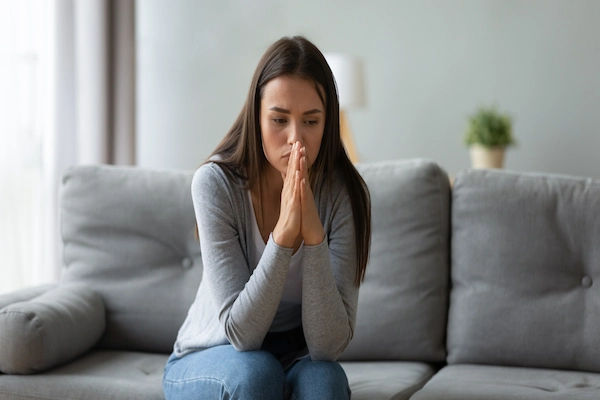Guide to Can Stress Affect Your Period
Discover how stress impacts your menstrual cycle. Learn the science behind stress-induced hormonal changes, common period irregularities, and practical tips to manage stress for a healthier period.


Introduction
You know the feeling: a big deadline is looming, a personal conflict is brewing, and suddenly, your period is nowhere to be found—or it arrives at the most inconvenient time. Is it just a coincidence, or is there a real connection? The answer is a resounding yes. Stress can profoundly impact your menstrual cycle, leading to delays, changes in flow, and intensified PMS. This isn't just in your head; it's a well-documented physiological process. This guide will delve into the science of how stress affects your period, identify the specific changes you might experience, and provide practical strategies to manage stress and regain control of your cycle. Understanding this link is the first step toward better menstrual health and overall well-being.
The Science Behind Stress and Your Menstrual Cycle
Your menstrual cycle is orchestrated by a delicate dance of hormones, primarily governed by the hypothalamus in your brain. This system is finely tuned but also highly sensitive to external factors, with stress being one of the most significant disruptors.
Your Brain's Command Center: The HPA Axis
The connection begins with the Hypothalamic-Pituitary-Adrenal (HPA) axis, your body's central stress response system. When you encounter a stressful situation—whether it's an emotional argument or a pressing work project—the hypothalamus signals the pituitary gland, which in turn tells the adrenal glands to release cortisol, the primary stress hormone.
The Stress Hormone: Cortisol's Role
Cortisol is crucial for the "fight or flight" response, shunting energy to essential functions needed for immediate survival. However, when cortisol levels remain elevated due to chronic stress, it can wreak havoc on other bodily systems, including reproduction.
The Impact on Reproductive Hormones
The problem is that the hypothalamus also controls the reproductive hormone axis (the HPG axis). It produces Gonadotropin-Releasing Hormone (GnRH), which triggers the release of hormones that stimulate ovulation. Under severe stress, the body essentially prioritizes survival over reproduction. The hypothalamus slows or stops the production of GnRH to conserve energy. This disruption can prevent ovulation, which throws off the entire timing of your menstrual cycle. Without ovulation, the hormonal cues for your period to start are delayed or absent, leading to a late or missed period.
How Stress Manifests: Common Period Changes
The hormonal disruption caused by stress doesn't have a one-size-fits-all outcome. Different women experience different symptoms, often depending on the intensity and duration of the stress.
Delayed or Missed Periods (Stress Amenorrhea)
This is the most common manifestation. If ovulation is delayed, your period will be late. If it's suppressed entirely, you may miss a period altogether. The medical term for the absence of menstruation for three or more cycles is amenorrhea, and stress is a leading cause of it. For many, the question "how long can stress delay a period" is top of mind; it can typically range from a few days to several months.
Changes in Flow and Duration
Stress can also alter the uterine lining's development, leading to periods that are unusually light or unexpectedly heavy. You might experience shorter cycles or, conversely, bleeding that seems to drag on for longer than usual.
Worsened Premenstrual Syndrome (PMS)
High cortisol levels can exacerbate mood swings, irritability, bloating, and anxiety in the days leading up to your period. This is because stress and reproductive hormones interact closely with neurotransmitters that regulate mood.
Spotting Between Periods
Less commonly, stress can cause minor hormonal fluctuations that lead to breakthrough bleeding or spotting between periods, even if your overall cycle remains regular.
Not Just Emotional: Different Types of Stress
It's important to recognize that "stress" isn't only psychological. Your body interprets many demands as stress.
Acute vs. Chronic Stress
A single stressful event (acute stress), like giving a presentation, might cause a minor, temporary blip. However, persistent chronic stress—from a demanding job, financial worries, or long-term caregiving—is what most commonly leads to significant and prolonged menstrual disruptions.
Physical Stress (Exercise, Diet, Illness)
Intense physical training, rapid weight loss, restrictive dieting, or battling an illness are all forms of physical stress. These can activate the same HPA axis, suppressing reproductive function just as effectively as emotional turmoil. This is why athletes or those with eating disorders often experience menstrual irregularities.Consult Top Specialists
How to Tell if Stress is Affecting Your Cycle
If you suspect stress is the culprit, the first step is to become a detective of your own body.
Tracking Your Cycle and Stress Levels
Start a detailed log. Use an app or a journal to track your period start and end dates, flow intensity, and any physical or emotional symptoms. Crucially, also note your perceived stress levels daily. Over a few months, patterns may emerge clearly linking high-stress weeks to cycle changes.
Ruling Out Other Underlying Conditions
It's vital to remember that while stress is a common cause, it's not the only one. Conditions like Polycystic Ovary Syndrome (PCOS), thyroid disorders, premature ovarian insufficiency, or other hormonal imbalances can cause similar symptoms. If your period is consistently irregular or absent for more than 90 days, consulting a doctor is essential to rule out these other conditions.
Regulating Your Cycle: Managing Stress for Better Health
The good news is that by managing stress, you can often coax your cycle back to regularity. It’s about signaling to your body that it’s safe to resume normal reproductive functions.
Mindfulness and Relaxation Techniques
Practices like meditation, deep breathing exercises, and yoga are proven to lower cortisol levels and calm the nervous system. Even 10 minutes of daily mindfulness can make a significant difference in your stress response over time.
The Role of Diet and Exercise
Nourish your body with a balanced diet rich in whole foods, complex carbohydrates, and healthy fats to support stable energy and hormone production. For exercise, shift from high-intensity workouts to gentler forms like walking, swimming, or cycling if you suspect overtraining is a factor. Movement is a fantastic stress reliever, but balance is key.
Prioritizing Sleep Hygiene
Sleep is when your body repairs itself and regulates hormones. Aim for 7-9 hours of quality sleep per night. Establish a calming bedtime routine, limit screen time before bed, and keep your sleep environment dark and cool.
When to Seek Professional Help
While lifestyle changes are powerful, there are times when professional guidance is needed. You should consult a doctor if:
1. You've missed three or more periods in a row.
2. Your periods were regular and suddenly became irregular.
3. You experience bleeding between periods or after sex.
4. You have severe pain, very heavy bleeding, or other concerning symptoms.
5. Your cycle doesn't return to normal within a few months of managing your stress.
If your symptoms persist beyond two weeks of self-care, consult a doctor online with Apollo24|7 for further evaluation. They can help determine if there's an underlying issue and guide you toward the right treatment, which may include home collection for tests like thyroid panel or prolactin level to check for other causes.
Quick Takeaways
1. Yes, stress directly affects your period by disrupting the hormonal axis between your brain and ovaries.
2. High cortisol levels can delay or prevent ovulation, leading to a late or missed period.
3. Changes aren't limited to timing; flow, PMS symptoms, and spotting can also occur.
4. Chronic stress is more impactful than acute stress on your cycle.
5. Tracking your cycle and stress can help identify patterns.
6. Lifestyle changes like mindfulness, balanced nutrition, and good sleep can help restore regularity.
7. Always consult a doctor for persistently irregular cycles to rule out other conditions.
Conclusion
The link between stress and your menstrual cycle is a powerful example of how deeply interconnected our mental and physical health truly are. A late or irregular period can be your body's unmistakable signal that it's under too much pressure and needs care. By understanding the science behind this connection—the cortisol-fueled disruption of your delicate hormonal balance—you can move from frustration to empowerment. Prioritizing stress management through mindfulness, balanced living, and proper rest is not a luxury; it's an essential component of gynecological health. Listen to what your body is telling you. If your cycle continues to be a source of concern despite your best efforts, remember that seeking professional help is a proactive step toward lasting well-being. If your condition does not improve after trying these methods, book a physical visit to a doctor with Apollo24|7 for a comprehensive assessment.Consult Top Specialists
Consult Top Specialists

Dr. Vivek D
General Physician
4 Years • MBBS
Bengaluru
PRESTIGE SHANTHINIKETAN - SOCIETY CLINIC, Bengaluru

Dr Syed Mateen Pasha
General Physician
2 Years • MBBS
Bengaluru
PRESTIGE SHANTHINIKETAN - SOCIETY CLINIC, Bengaluru

Dr. Shubham Chauhan
General Practitioner
4 Years • MBBS
Lucknow
Apollo 24|7 Clinic - Uttar Pradesh, Lucknow

Dr. Harshendra Jaiswal
General Physician/ Internal Medicine Specialist
12 Years • MBBS , MD (General medicine)
Kolkata
108 DHANA DHANVANTARI Clinic, Kolkata
(25+ Patients)
Dr. Thandra Ramoji Babu
General Physician/ Internal Medicine Specialist
5 Years • MBBS, DNB(General Medicine)
Warangal
Sai Ram multi-specialty hospital, Warangal
Consult Top Specialists

Dr. Vivek D
General Physician
4 Years • MBBS
Bengaluru
PRESTIGE SHANTHINIKETAN - SOCIETY CLINIC, Bengaluru

Dr Syed Mateen Pasha
General Physician
2 Years • MBBS
Bengaluru
PRESTIGE SHANTHINIKETAN - SOCIETY CLINIC, Bengaluru

Dr. Shubham Chauhan
General Practitioner
4 Years • MBBS
Lucknow
Apollo 24|7 Clinic - Uttar Pradesh, Lucknow

Dr. Harshendra Jaiswal
General Physician/ Internal Medicine Specialist
12 Years • MBBS , MD (General medicine)
Kolkata
108 DHANA DHANVANTARI Clinic, Kolkata
(25+ Patients)
Dr. Thandra Ramoji Babu
General Physician/ Internal Medicine Specialist
5 Years • MBBS, DNB(General Medicine)
Warangal
Sai Ram multi-specialty hospital, Warangal
More articles from Stress
Frequently Asked Questions
1. How long can stress delay your period?
Stress can delay your period by a few days to several months. For most women, a delay of a week or two is common during particularly stressful times. If the stress is chronic, it could lead to missing multiple cycles (a condition known as stress-induced amenorrhea).
2. Can stress cause you to miss a period entirely?
Yes, absolutely. If stress is severe enough to completely suppress ovulation, your body will not undergo the hormonal changes that trigger the shedding of the uterine lining, resulting in a missed period.
3. What are the signs stress is affecting your period?
The primary sign is a change from your normal pattern. This includes a late period, a missed period, unusually light or heavy bleeding, shorter or longer cycles, worsened PMS symptoms (like cramps or mood swings), or spotting between periods.
4. How can I get my period back after stress?
Focus on stress reduction techniques. This includes practicing yoga or meditation, ensuring you get enough quality sleep, eating a nutritious and balanced diet, and engaging in moderate, enjoyable exercise. Your period should typically return once your stress levels decrease and your body feels 'safe' again to allocate energy to reproduction.
5. When should I be worried about a late period?
If you've had unprotected sex and could be pregnant, take a test. If you're not pregnant, see a doctor if you miss three or more periods in a row, if your irregular cycles are a new and persistent problem, or if you have any other concerning symptoms like severe pain or heavy bleeding.




